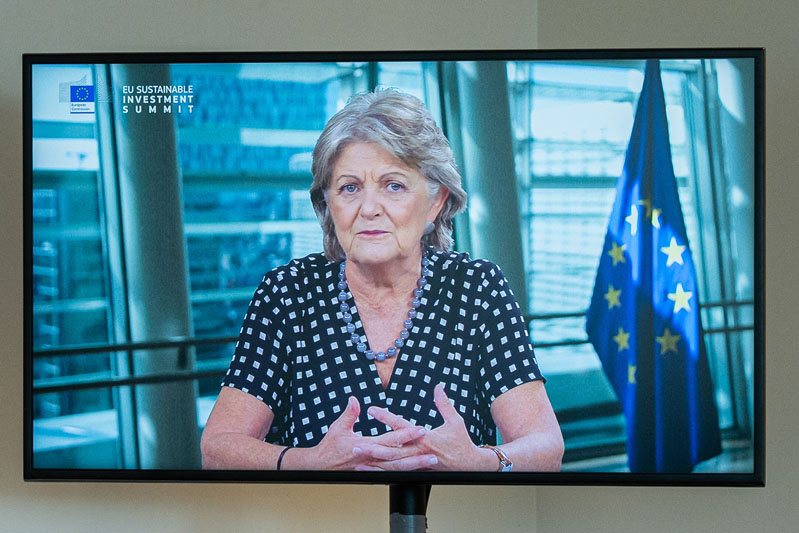Connecting investment with the will to go greener through robust local projects
“While the European Green Deal sets goals at a European level, much of the green transition must actually happen at the regional and local level”. Commissioner for Cohesion and Reforms Elisa Ferreira opened this session of the EU Sustainable Investment Summit bringing attention to the need to focus on the needs of the regions and on the unfolding of the investment projects on the ground.

To help regions and cities undertake green projects, the European Commission has earmarked over 100 billion euros for investments in climate and environment, she stated. “In the coming months all submitted programmes will be thoroughly reviewed to ensure they are genuine investments in the green transition and that they comply with the ´do no significant harm´ principle,” she explained. Additionally, the Commission will seek to ensure that all relevant environmental actors are involved in the planning and delivering of the programmes.
Commissioner Ferreira also committed to supporting capacity building in all regions and sectors. “Our experience with local and regional actors is that they are willing and committed, but some of them lack expertise. They need to build capacity and learn from each other,” she indicated.
One of the main concerns regarding the green transition is how it will affect industrial sectors that are heavily employed. In this regards, in his keynote address, Slovenian Minister of Finance, Andrej Šircelj pointed out the importance of investing in knowledge and skills that will secure people’s jobs in a greener economy. “The Recovery and Resilience Facility also envisages green investments in soft measures such as skills, knowledge and literacy,” he flagged.
More attractive projects and policies that facilitate investment
In the current context of high market liquidity, the challenge is to develop a robust pipeline of investment projects for the European Green Deal. Odile Renaud-Basso, President of European Bank for Reconstruction and Development (EBRD) indicated that it is the bank’s role to contribute to developing more bankable projects that can attract and be financed by private-sector resources.
To give liability and confidence to private investors, she explained that at EBRD they work with countries to ensure they implement policies that will facilitate this investment. “This means having the proper regulatory and legal environments,” she emphasized.
From the industry perspective, non-independent Director of ArcelorMittal Vanisha Mittal Bhatia pointed out that they are still faced with significant risks of innovation and scaling these technologies. “For industry to remain competitive, we need the support of governments and stakeholders in the transition,” she explained, referring to a project they will develop with the local government of Gent that will reduce the entire greenhouse gas emissions of Flanders by 4%.
“We have money available and there is appetite on the other side, but to connect the two we need to de-risk the transition,” explained MEP Pascal Canfin, who indicated that there is a wide support, from the center-right to the greens, to the Green Deal regulations that are now being negotiated and that will mean changing 54 laws.
To attract investors, it is also important to make new technologies and innovative projects attractive. For Diego Pavia, CEO of EIT InnoEnergy, it is not only about the money, but also about the approach to the value chain. “As a citizen would you be willing to pay 100 € extra to have a car that is 100% green steel based? The answer is yes”, he said.
“There is more and more a clear understanding from companies and citizens that no action is not a choice and that the cost of no action will be higher,” added President of the EBRD, who reminded the important role that countries like China, India and the United States play in the transition.
WTO-compatible carbon pricing
For EBRD President, “economically carbon pricing is key if you want to deliver at the best possible cost the transition”. She acknowledged that carbon pricing is complex and involves very hard decisions, but “it is the more efficient way to ensure that we have the right incentives to move faster.”
On the Carbon Border Adjustment Mechanism (CBAM), MEP Pascal Canfin expressed the desire to have a WTO-compatible mechanism. “If it is within the WTO, it is within the rules signed by all of us, including China and the US. The last thing we want is a trade war on climate,” he concluded.
